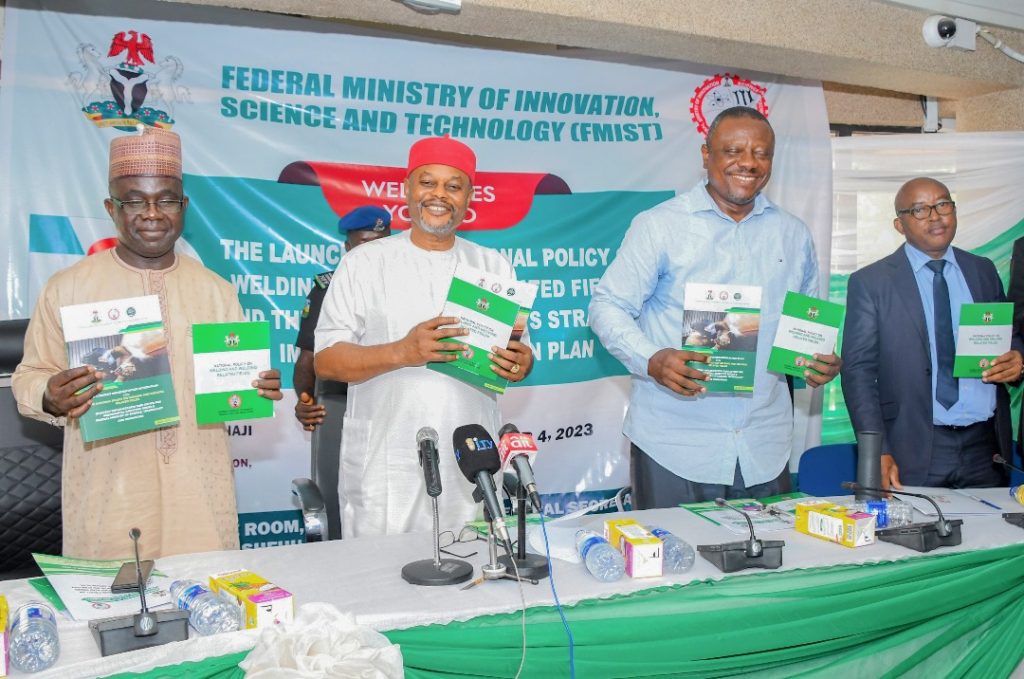
The Minister of Innovation Science and Technology (FMIST), Chief Uche Nnaji has issued a compelling call to both the private and public sectors, urging them to champion and promote local welders.
He emphasised that Nigeria incurs an annual loss of $10 billion in revenue by importing welders with international certification, despite having over one million skilled welders within its borders.
Nnaji made this clarion call during the launch of the National Policy on Welding and Welding Related Fields, presenting its strategic implementation action plan at the Ministry Headquarters in Abuja.
Aligning with President Bola Tinubu’s ‘Renewed Hope’ agenda, the ministry aims to expedite Nigeria’s industrialisation by emphasising standardised practices, quality enhancement and innovation in welding across diverse sectors. The overarching vision is to foster a self-sufficient and globally competitive Nigerian welding sector, making a significant contribution to the international supply chain.
In addressing the long-standing issue of neglect and lack of regulation in the welding sector, Nnaji stressed the importance of internationally recognized certification for industry practitioners. He lamented that the absence of such certification has hindered the indigenous welding sector from making a substantial contribution to Nigeria’s economy, especially in lucrative sectors like oil and gas.
“Due to the global welding market’s emphasis on international certification of its service providers, our local welding professionals face challenges in showcasing their talents and potential. To rectify this, we have introduced the National Policy on Welding and Welding Related Fields to promote the use of local welding personnel in critical economic sectors,” he stated.
Research indicates that welders contribute over 70 per cent to all fabricated products, with substantial components of welder wages being inadvertently exported. The influx of foreign welding personnel, particularly in the oil and gas industry, has further compounded the challenges faced by local professionals.
The recent approval of the National Policy on Welding and Welding-Related Fields is a pivotal step towards addressing this issue. The policy aims to prioritise the utilisation of local welding personnel in critical sectors of the economy, particularly in oil and gas.
The Federal Government, in collaboration with the Nigerian Institute of Welding (NIW), is set to establish six Centres of Welding Excellence across the six geopolitical zones. These centres will provide training and ISO certification to local welders, empowering them to work both locally and internationally. This initiative aligns with the objectives of Presidential Executive Order No. 5, which seeks to boost local content in production.
Nnaji emphasised that the implementation of this policy is vital for the growth of the manufacturing industry and is a crucial component of Nigeria’s industrialisation efforts. He asserted that it would not only fight poverty and create employment opportunities but also contribute significantly to the overall industrialisation of the country.
Highlighting the economic liberation potential of the policy, the Permanent Secretary of IST, James Sule emphasised its critical role in impacting the nation’s economy positively.
“The welding practice is critical to any nation’s economy, either developed or developing, as it directly impacts every socio-economic development and sustainability. This policy will liberate the country economically. It is high time we pay more attention to this critical sector that can provide jobs and generate wealth for our teeming population,” Sule affirmed.
Further reinforcing the importance of welding in the nation’s economic development, Sule mentioned the 2014 approval of the National Skills Qualification Framework. This framework was designed to create a career path for individuals seeking to acquire necessary skills in welding and related fields, receiving national certification from the Nigerian Institute of Welding.
The board secretary of the Nigerian Institute of Welding (NIW), Solomon Ebiri highlighted the broad positive impact the national policy on welding would have on technology, small and medium-sized enterprises (SMEs), the informal sector, human capacity, infrastructure, equipment manufacturing and quality control improvements.
Ebiri emphasised that the policy, when implemented, could save Nigeria over $10 billion lost annually due to capital flight resulting from the importation of various cadres of welding personnel. This financial drain is often attributed to reasons such as equity funding on projects or in the name of technical partners’ interest.
In conclusion, he noted that the policy would not only reposition Nigeria’s path to national economic development but also create avenues for the production of finished goods, fortify SMEs and manufacturing, establishing a robust and self-reliant nation. The National Policy on Welding and Welding-Related Fields stands as a cornerstone for economic empowerment, job creation and sustainable growth in Nigeria.

